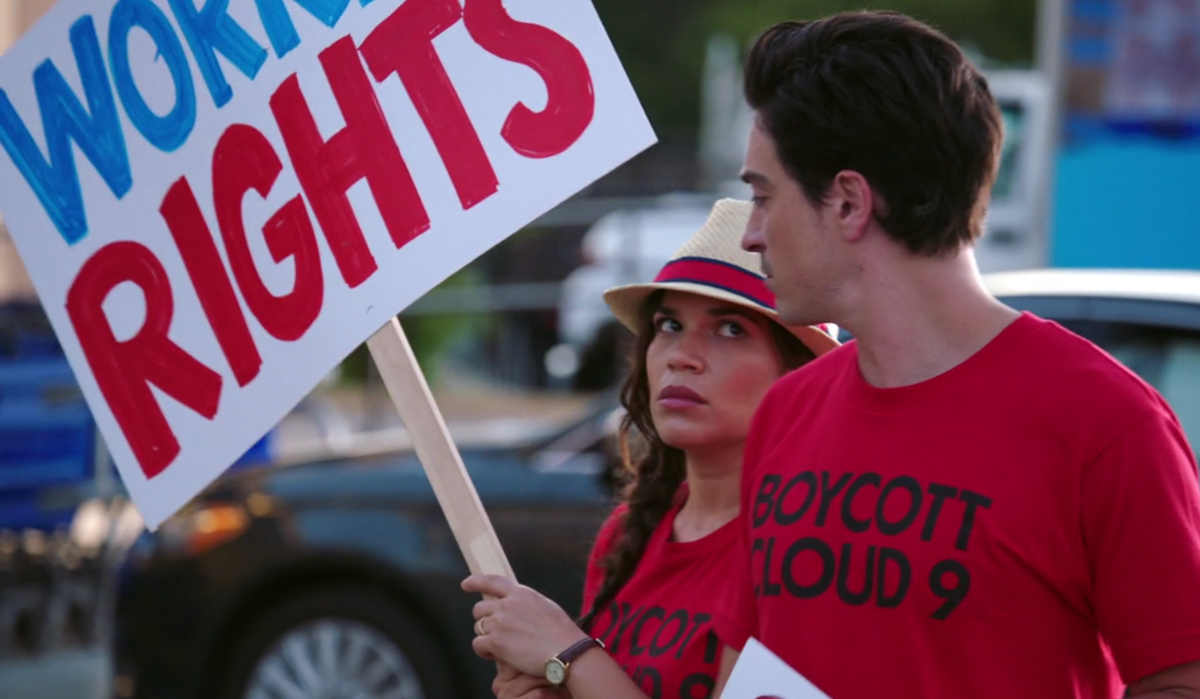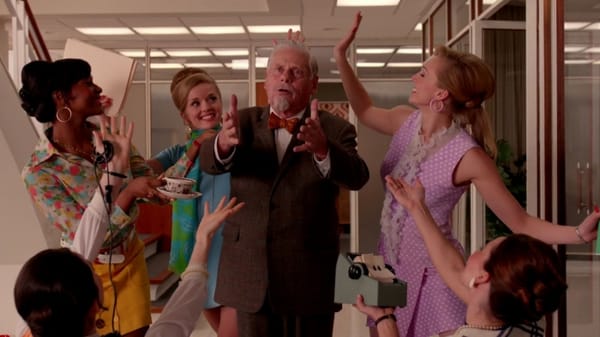So You Want To Learn More About The WGA Strike
On why film and TV writers across the country are striking.

America Ferrera, Ben Feldman, Superstore, NBC
You’ve probably heard that, as of last Tuesday, May 2nd, 2023, the Writers’ Guild of America is on strike. This is huge news for anyone whose job is even tangentially related to the film and television industry, but if you’re not a writer in Hollywood yourself, the details of the strike might not feel particularly clear.
I didn’t grow up with a strong understanding of how unions work or why the labor movement matters, and I was a TV fan but not yet a TV critic when the last WGA strike happened in 2007. Thus, I’ve been educating myself on the particulars of this strike on the spot, and I’m certain I’m not the only one. It’s difficult to join the fight for fair wages and treatment when you don’t know what’s at stake, and there’s no shame in coming into this situation with a lot to learn. But there’s also tremendous benefit in seeking out more information and finding ways to show solidarity that feel right for you.
With that being said, I’ve put together some resources that have helped me better understand the strike, shared here in FAQ form. Please keep in mind that I’m in no way affiliated with the WGA (aside from as a passionate supporter of great TV!) and that any opinions expressed here are mine and mine alone. This is merely a quick guide for Hey, What Are You Watching? subscribers who want to learn more. Regular readers, I’ll be back with my typical newsletter next week.
Who are the parties involved?
The workers on strike are members of the Writers Guild of America, a union with a membership thousands-strong that is divided into an East Coast (WGAE) and West Coast (WGAW) group.
While the “Writers” label sounds pretty broad, it’s worth noting that the WGA largely represents television and film writers, meaning that other types of writers who work in different formats – including, surprisingly, animation – are not under the same contract (per The Animation Guild’s official website). This is important to note because when it comes to naming and shaming productions that are blatantly carrying on without their writers (a valid and important strategy for strike supporters), not every project you see will be beholden to a WGA contract or lack thereof.
On the other side of the bargaining table is the Alliance of Motion Picture and Television Producers (AMPTP), which is described on its official website as “the entertainment industry's official collective bargaining representative.” This group is widely known to represent the business interests of major studios and streamers, including but not limited to Netflix, Apple TV+, Disney, Warner Bros Discovery, Paramount, and Amazon (per Backstage).
As ABC News points out, the strike is particularly thorny to navigate for showrunners who work as both writers and producers. Halt and Catch Fire co-creator Christopher Cantwell recently shared a beautiful story about his own experiences prepping for a strike, and I think it’s a great example of how complex yet vital the decision for showrunners to show solidarity from within productions is.
There are also other unions throwing their support behind the WGA. On May 3, Variety reported that a rally held in solidarity included tons of support from other Hollywood unions, as well as representatives from Teamsters, America’s largest union whose membership includes a wide range of blue and white-collar workers (per teamsters.org). Unions that cover “below-the-line” crew members (IATSE), actors (SAG-AFTRA), and directors (DGA) have all voiced support for the WGA, as have others that I’m surely missing. It’s also worth noting that some of these unions have contracts of their own expiring soon.
What is the WGA asking for, and why should I care?
The WGA’s demands will likely evolve over time, so the best way to keep up with them is by reading them yourself on their official website. Some of the fourteen bullet points currently included ask for regulations on the use of artificial intelligence tools in the industry, transparency and standardization for residual payments from streamers, and an end to “the abuses of mini-rooms,” a concept that Franchesca Ramsey explains here.
Mostly, though, writers are asking for fair pay in an industry that has devalued their work as streaming has taken over as the dominant form of television. As the WGA points out (via CBS News), showrunners working on streaming shows are making only 46% of the pay that traditional network TV showrunners make. The salaries of the execs at the top of the industry, meanwhile, are frankly outrageous, with the eight major studio heads (as in, just eight dudes) earning over $773,000,000 combined in 2021 per Variety.
Many writers, meanwhile, say they’re left living paycheck to paycheck thanks to a broken system that makes finding steady work for a living wage difficult. A writer on the award-winning series The Bear shared a story last month about accepting a major award for the show while his bank account was in the negative. Other writers have spoken up about similarly dissonant financial situations, and though I’m a different type of writer (and, again, not a WGA member), I can certainly relate.
While it’s easy to look at people who are dolled up for award shows or movie premieres and assume they’re making bank, the fact is that the arts as a whole have become a largely gig-based economy – a string of short-term, typically underpaid jobs with limited benefits. For much of my writing career, I was food stamp eligible, working multiple jobs, and was also one missed paycheck or flat tire away from not making rent. Even now, despite writing full-time, I’m still on state insurance and don’t get any paid vacation or sick time due to the fractured structure of the industry. The WGA’s demands, from my perspective, aim to make the flawed system fairer – and, importantly, long-term sustainable – for all involved.
If all of this still hasn’t convinced you to care, here’s an article about why this strike is historically significant for everyone, not just those working in the movie biz.
What has the strike’s impact been so far?
First of all, it’s important to note that, if you are standing in solidarity with the WGA, any news you read about productions being shut down or delayed is a good thing. The strike’s aim is to throw sand in the gears of the entire Hollywood system, and as far as I can tell, the quicker that impact is made, the quicker negotiations will hopefully progress and get everyone back to work at the jobs they love.
With that said, the first week of the strike has already caused significant impacts. Late-night talk shows have shut down until the strike comes to an end, as has Saturday Night Live. After picketers managed to disrupt filming on the Paramount+ show Evil on Friday, the show wrapped production on its fourth season early, with Variety also noting that a cast member had to leave for a personal reason (side note, Evil is a really great show that you should definitely watch, and I hope the cast member is okay).
Meanwhile, a planned picket line and the strike-supporting exit of host Drew Barrymore led the MTV Movie & TV Awards to cancel their live show. Barrymore isn’t the only star to support the WGA; many celebrities have been interviewed on the picket line, and John Mulaney, Jon Stewart, and Michael J. Fox (among others) have canceled events in solidarity with the WGA. Perhaps the biggest win for the WGA yet came via Stranger Things; the show’s co-creators, the Duffer brothers, announced via Twitter that the show plans to pause production and remain shuttered until an agreement is reached, ostensibly taking Netflix’s flagship series out of commission until writers are paid their worth. The team behind HBO’s Hacks has also announced they’re shutting down production.
While there’s plenty to cheer about here, there’s also been some studio pushback. Disney is reportedly demanding that showrunners continue work during the strike, and reports indicate that major shows like Andor, House of the Dragon, and The Rings of Power have chosen to continue production, ostensibly without anyone working on set in a writing capacity. While there seem to be a few schools of thought on this, I appreciated the insights You creator Sera Gamble provided about the importance of on-set writers in this Twitter thread.
Finally, on the decidedly dystopic end of things, two writers have already reported (per The Wrap) that they were intentionally hit by a vehicle while picketing.
Where should I be looking for coverage of the strike?
Pretty much every news outlet around is providing strike coverage in some way, shape, or form, but I included this question because I think there’s an elephant in the room when it comes to how the strike is already being reported. I’ve seen a number of headlines and social media posts from major outlets that seem to use pointed or misleading language to frame events related to the strike, and it’s not unreasonable to assume that this language has the effect of making folks who don’t have much context for the story freak out about the future of their favorite show or film – and blame the people who went on strike for the delay.
For example: in an interview with Collider, Joel McHale recently shared his support for the WGA and, when asked about how the strike could impact filming on the Community movie, said, “I'm not exactly sure, but I’m guessing it's not going to start on time.” I wrote up this snippet of news at Slashfilm, and attempted to add context that I thought was important, including that the film’s production timeline hasn’t been publicly set in stone until this point, that McHale said this in the context of supporting striking writers, and that as McHale says, he’s not even sure the production will be impacted. If a news source hypothetically wanted to move anti-WGA sentiment, though, it would be easy to frame this in oversimplified terms: “You Waited Ages For The Community Movie, And The Strike Is Totally Ruining It.” I’ve seen purposely context-stripped stories that fit this bill pretty much every day since the strike began.
While it’s unfortunate to ever have to consider the idea that media sources would try to tilt the scales in the studios’ favor, entertainment journalism obviously relies on access, meaning that outlets (and even individual writers) often have working relationships with studios that they might believe could be impacted for the worse by the stand they take – or choose not to – in the face of the strike. It’s subtle and messy and not fun to navigate (for you as a reader or me as a writer), but personally, I do think some pretty clear-cut pro-studio propaganda is already making the rounds. It’s fine if you don’t, but as consumers, it’s always important to do our due diligence and read beyond the headline, and I think that’s especially true in this case.
In my opinion, the best way to understand the current state of the movement is to listen to the people who are directly impacted by the industry’s shortcomings – WGA writers themselves.
What can I do to show solidarity with the WGA from afar?
- You can talk about the strike, in person or online using the WGA’s official social media toolkit.
- You can donate to an official snack fund bringing food to picketers in LA.
- You can also donate to the Entertainment Community Fund, which supports those who are financially impacted by the strike.
- If you’re the head of an organization, you can sign the list of orgs currently in support of the strike.
- Finally, if you have a job that’s either directly or tangentially related to the work of the WGA and feel like something you would typically do could amount to scabbing or crossing a picket line – don’t do it! I canceled my RSVP to an award season For Your Consideration event thrown by a streaming company last week (for a project involving a WGA writer!) because it didn’t feel right to attend.
What can I do to show solidarity with the WGA in person?
- If you’re able to, join a picket line: here’s the schedule for LA and NYC residents.
- If you’re a local business owner, consider offering a discount to folks participating in the strike. Here’s a thread of some companies that are already doing that.
- Bring food or supplies to a picket line! Anything helps, although I’ve heard murmurings that everyone’s getting sick of pizza and donuts. Think about what you would want to eat, drink, or have if you were walking around in the sun for several hours, and drop that off to show support! I’m hoping to go on my next weekday off and bring mini ice packs, sunscreen, Gatorade, or something similarly cooling and thirst-quenching.
- Finally, don’t let your support wane over time: the last writers’ strike lasted 100 days, and picketers will need people showing up for them on day 99, not just day 1.
Thanks for reading. If you have tips for resources to add, please feel free to share them in the comments. If you think I missed something, go easy on me, I wrote this for my aunties.




